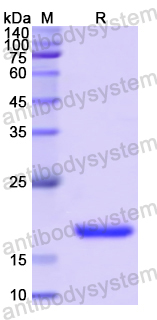Catalog No.
YHH30801
Expression system
E. coli
Species
Homo sapiens (Human)
Protein length
Ser57-Leu198
Predicted molecular weight
18.27 kDa
Nature
Recombinant
Endotoxin level
Please contact with the lab for this information.
Purity
>90% as determined by SDS-PAGE.
Accession
Q16595
Applications
ELISA, Immunogen, SDS-PAGE, WB, Bioactivity testing in progress
Form
Lyophilized
Storage buffer
Lyophilized from a solution in PBS pH 7.4, 0.02% NLS, 1mM EDTA, 4% Trehalose, 1% Mannitol.
Reconstitution
Reconstitute in sterile water for a stock solution. A copy of datasheet will be provided with the products, please refer to it for details.
Shipping
In general, proteins are provided as lyophilized powder/frozen liquid. They are shipped out with dry ice/blue ice unless customers require otherwise.
Stability and Storage
Use a manual defrost freezer and avoid repeated freeze thaw cycles. Store at 2 to 8°C for frequent use. Store at -20 to -80°C for twelve months from the date of receipt.
Alternative Names
FXN, Frataxin(81-210), Friedreich ataxia protein, m56-FXN, Frataxin, mitochondrial, Fxn, d-FXN, m78-FXN, i-FXN, m81-FXN, X25, FRDA
Long-Read Sequencing Identifies Mosaic Sequence Variations in Friedreich's Ataxia-GAA Repeats., PMID:40507780
Omaveloxolone, But Not Dimethyl Fumarate, Improves Cardiac Function in Friedreich's Ataxia Mice With Severe Cardiomyopathy., PMID:40501183
Base editing of trinucleotide repeats that cause Huntington's disease and Friedreich's ataxia reduces somatic repeat expansions in patient cells and in mice., PMID:40419681
Sulforaphane Targets Multiple Pathological Processes in Friedreich Ataxia Patient-Induced Pluripotent Stem Cell-Derived Sensory Neurons., PMID:40406806
Inhibition of Rho-associated kinases ROCK1 and ROCK2 as a Therapeutic Strategy to Reactivate the Repressed FXN Gene in Friedreich Ataxia., PMID:40404357
Therapeutic combination of L-ascorbic acid, N-acetylcysteine, and dimethyl fumarate in Friedreich's ataxia: insights from in vitro models., PMID:40375363
Brain microvascular endothelial cells differentiated from a Friedreich's Ataxia patient iPSC are deficient in tight junction protein expression and paracellularly permeable., PMID:40303283
MSH2 is not required for either maintenance of DNA methylation or repeat contraction at the FMR1 locus in fragile X syndrome or the FXN locus in Friedreich's ataxia., PMID:40296143
Aromatase reduces sperm motility by down-regulating the expression of proteins related to ATP synthesis in seminal plasma extracellular vesicles., PMID:40155807
Nomlabofusp, a Fusion Protein of Human Frataxin and a Cell Penetrant Peptide, Delivers Mature and Functional Frataxin into Mitochondria., PMID:40140196
Robust behavioral assessment of the inducible Friedreich's ataxia mouse does not show improvement with NRF2 induction., PMID:40017373
Frataxin deficiency and the pathology of Friedreich's Ataxia across tissues., PMID:39981684
Frataxin Traps Low Abundance Quaternary Structure to Stimulate Human Fe-S Cluster Biosynthesis., PMID:39909887
Functional Characterization of Parallel Fiber-Purkinje Cell Synapses in Two Friedreich's Ataxia Mouse Models., PMID:39907933
Design and validation of cell-based potency assays for frataxin supplementation treatments., PMID:39823061
Friedreich Ataxia: An (Almost) 30-Year History After Gene Discovery., PMID:39810753
Friedreich ataxia: what can we learn from non-GAA repeat mutations?, PMID:39810561
Low expression of Frataxin might contribute to diabetic peripheral neuropathy in a mouse model., PMID:39721363
Altered Ca2+ responses and antioxidant properties in Friedreich's ataxia-like cerebellar astrocytes., PMID:39648860
Two-stage binding of mitochondrial ferredoxin-2 to the core iron-sulfur cluster assembly complex., PMID:39632806
Differential Gene Expression in Late-Onset Friedreich Ataxia: A Comparative Transcriptomic Analysis Between Symptomatic and Asymptomatic Sisters., PMID:39519164
Uniparental IsoDisomy: a case study on a new mechanism of Friedreich ataxia., PMID:39496895
Sexual dimorphism in a mouse model of Friedreich's ataxia with severe cardiomyopathy., PMID:39363102
Downregulation of Iron-Sulfur Cluster Biogenesis May Contribute to Hyperglycemia-Mediated Diabetic Peripheral Neuropathy in Murine Models., PMID:39334695
Case Report of Friedreich's Ataxia and ALG1 -Related Biochemical Abnormalities in a Patient With Progressive Spastic Paraplegia., PMID:39324476
Deciphering the ferroptosis pathways in dorsal root ganglia of Friedreich ataxia models. The role of LKB1/AMPK, KEAP1, and GSK3β in the impairment of the NRF2 response., PMID:39243573
mTORC1 Signaling Inhibition Modulates Mitochondrial Function in Frataxin Deficiency., PMID:39211218
Interplay of FXN expression and lipolysis in white adipocytes plays a critical role in insulin sensitivity in Friedreich's ataxia mouse model., PMID:39191875
FXN targeting induces cell death in ovarian cancer stem-like cells through PRDX3-Mediated oxidative stress., PMID:39184439
Fluvoxamine maleate alleviates amyloid-beta load and neuroinflammation in 5XFAD mice to ameliorate Alzheimer disease pathology., PMID:39136022
A multiple animal and cellular models approach to study frataxin deficiency in Friedreich Ataxia., PMID:39134123
Glial cell activation precedes neurodegeneration in the cerebellar cortex of the YG8-800 murine model of Friedreich ataxia., PMID:39111701
DNA Base Damage Repair Crosstalks with Chromatin Structures to Contract Expanded GAA Repeats in Friedreich's Ataxia., PMID:39062522
Anatomical and functional analysis of the corticospinal tract in an FRDA mouse model., PMID:39005321
Neurotrophic tyrosine receptor kinase gene fusions in adult and pediatric patients with solid tumors: a clinicogenomic biobank and record linkage study of expression frequency and patient characteristics from Finland., PMID:38967220
Generation of genetically modified Friedreich's ataxia induced pluripotent stem cell lines and isogenic control lines carrying an inducible neurogenin-2 expression cassette., PMID:38936158
The Regulation of the Disease-Causing Gene FXN., PMID:38920668
An In Silico Analysis of Genetic Variants and Structural Modeling of the Human Frataxin Protein in Friedreich's Ataxia., PMID:38891993
Identifying therapeutic target genes for migraine by systematic druggable genome-wide Mendelian randomization., PMID:38867170
Insights into the effects of Friedreich ataxia on the left ventricle using T1 mapping and late gadolinium enhancement., PMID:38814901
Glial overexpression of Tspo extends lifespan and protects against frataxin deficiency in Drosophila., PMID:38750879
Mapping Novel Frataxin Mitochondrial Networks Through Protein- Protein Interactions., PMID:38746130
Protective Role of Dioscin against Doxorubicin-Induced Chronic Cardiotoxicity: Insights from Nrf2-GPX4 Axis-Mediated Cardiac Ferroptosis., PMID:38672439
Frataxin deficiency shifts metabolism to promote reactive microglia via glucose catabolism., PMID:38631900
Pharmacotherapeutic strategies for Friedreich Ataxia: a review of the available data., PMID:38622054
Expression and processing of mature human frataxin after gene therapy in mice., PMID:38600238
The Mechanism of Folding of Human Frataxin in Comparison to the Yeast Homologue - Broad Energy Barriers and the General Properties of the Transition State., PMID:38552947
A peptide derived from TID1S rescues frataxin deficiency and mitochondrial defects in FRDA cellular models., PMID:38495102
Generation and characterization of iPSC lines from Friedreich's ataxia patient (FRDA) with GAA.TTC repeat expansion in the Frataxin (FXN) gene's first intron (IGIBi016-A) and a non-FRDA healthy control individual (IGIBi017-A)., PMID:38484450

